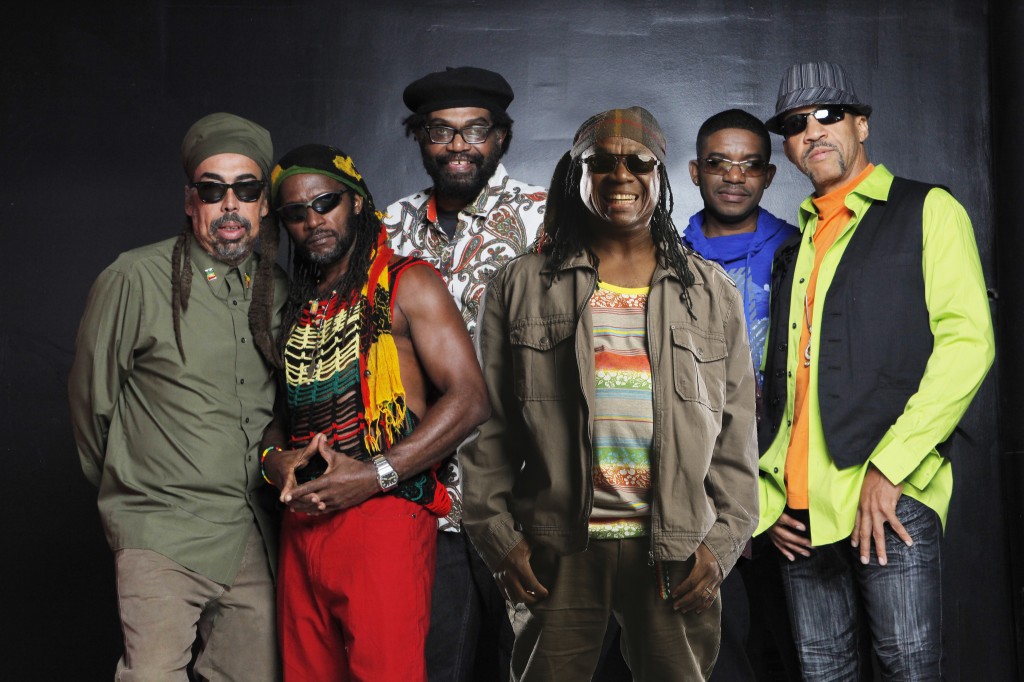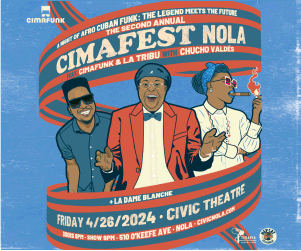Third World made a name for themselves back in the early 1970s, when roots reggae was first hitting the music scene. They started as a small group in Kingston, Jamaica and quickly garnered acclaim with their third album, Journey to Addis, which featured their hit cover of The O’Jays’ “Now That We Found Love.” The band released many more albums in the ensuing decades, gaining even more success and continuing to tour the world.
Their next big stop will be this Saturday, when they headline New Orleans’ first-ever Roots Reggae Culture Festival. I spoke with founding member and guitarist, Stephen “Cat” Coore, who was eager to answer any and all questions we had for him ahead of this weekend’s festival. We discussed the band’s early years, why New Orleans needs a reggae festival, how his spirituality affects his music and much more.
 Obviously you guys have performed here in New Orleans before. Do you have any sort of connection to the city?
Obviously you guys have performed here in New Orleans before. Do you have any sort of connection to the city?
Yeah, well from very early on New Orleans has always been, almost like a nest, for blues and jazz and that kind of music. Way back in the fifties the radio used to pick up New Orleans stations and that’s where we got a lot of music from. New Orleans is the one of the only cities that I’d say has a full connection to reggae and Caribbean music.
You guys started in the early seventies, what was it like getting the band up and running in Kingston around that time? What was the atmosphere like back then for up and coming reggae musicians?
I wouldn’t say it was really hard to get the band up and running in Kingston. The real challenge was getting your music heard internationally. In those days, if you were a band from Kingston then that was the way to go. You had all kinds of different bands back then like The In Crowd, The Mighty Vikings…I mean we had bands galore. And Bob Marley really opened the door for us. Not just him, but Chris Blackwell and Island Records, too. They really helped by spending money on reggae music worldwide and getting it played on radio stations. But in the seventies, we were definitely on a high.
Being in a band over 40 years, does it seem like it mostly comes naturally now or are you still finding new and interesting ways to write music and perform?
Well, to be honest, it does seem like nowadays a lot of stuff comes naturally to us. Like for us to write a show or know what to do at a particular concert when things don’t go as planned and we have to adjust. I think we’re really good at that. The real challenge has been coming up with new material that’s relevant in this time when the music has changed so dramatically, you know. There’s all kinds of stuff happening and everybody’s with a record company now because of the internet. So the playing field is much more leveled and the competition is much greater. So lately we’ve been reaching out. Right now, we’re working with Damian Marley and he’s producing our next album project. So between him and the other Marley brothers, we like to link up with them because we think they’re probably the most progressive in reggae right now. It’s really something special, working with Damian right now and we got some good, new music we’re working on.
Are there any young, aspiring artists today who you can see being the future of reggae? Or going big in any genre?
Well, like I said I think the Marleys are at the top of the spectrum. I mean they really carry the legacy and, of course, what Bob did was so unimaginably great. But let’s put the Marleys aside. I think Chronixx seems to be somebody who can do well in the future.
And there are quite a few Jamaican kids who are getting back to the old form of reggae and I definitely think the music is in good hands with these kids who are coming up now. I’m really quite proud of them.
I’m sure people at the fest are doing the best they can to recreate the roots reggae culture. How do you view the culture of reggae here in America as opposed to on the islands?
I think the culture of reggae has really spread out in America recently, you know. There are all these white reggae bands from California who are doing really great. I mean, you have guys like SOJA and Rebelution who are doing really well. But that shows that there are younger folks who listen to reggae and know the music. And that kind of spreads over to us veterans, too. Because we get some of that fan base when people may think, “Oh, well here are the guys who influenced Rebelution,” or, “Here are the guys who made an impact on SOJA.” But I think reggae music in America is quite huge now and that it’s really grown over the last few years.
Are any artists you admire performing at the festival?
Yeah, I admire all the acts that are performing. I-Wayne, Capleton, those are just two incredible acts. And then the day after we perform there are some amazing acts and this is really good for New Orleans. Because you guys have Jazz Fest, you have an Essence Fest, so, yeah, you need a Reggae Fest.
Yeah, this is the first one since before Katrina.
Yeah, and Katrina really made a massive change in that town. The things we used to do in New Orleans haven’t happened since Katrina, it changed the whole dynamic of everything. We still come there and everything, but the places we used to go are very different. A lot has changed so dramatically and it’s very sad. But, in a way, it’s also cleansing, you know. Like when the hurricane [Gilbert] hit Jamaica, it was a very similar thing and a lot of spiritual people and Rastafarians saw it as cleansing. It cleaned out and turned things around and at the end of the day you guys have bounced back and I want to give lots of love to the people of New Orleans.
So how do you feel your spirituality affects your music?
Well it’s really a matter of the Creator touching me with inspiration. And, you know, everyone has to look within themselves to find their own spirituality. But I think God lives in each and every one of us, because theBible tells us that God made man in the image of Himself. We all have God’s spirit within us and that spirit comes out and touches us with inspiration. But we are also touched with sadness and other emotions which brings us to create paintings and writings and statues and songs, you know. So, it’s all one big melting pot of spirituality. So that’s why it’s important for America to look within itself for this next election coming up and see where the country is going.
Who were some of your influences growing up?
Well, clearly Bob Marley has to be at the top of that list. But then also Carlos Santana who’s influenced me personally. Very much so because when we were listening to rock music Carlos came with something more melodic and more “up my street” than, say, greats like Eric Clapton and Jimi Hendrix. They were blues players, you know. And Carlos did this thing where he kind of mixed Latin music in with blues. So yeah his music was a very big influence on me. Then, of course, Stevie Wonder. He was very influential to me as well. But those would be the three people I would say influenced me the most.
Have you had the pleasure of performing or making music with them?
All three. Yeah I worked with Stevie Wonder on our collaboration song “Try Jah Love”. We toured with Santana, and on our tour he’d bring Third World out every night, and we worked with Bob Marley when we signed to Island Records when we were kids. So I’ve had a chance to work with all three of them and I’m very proud of that, we’ve made some really good memories, you know.
What is it like back at home? Is everyone always like, “Hey, those are the guys from Third World?” What is the atmosphere like?
The atmosphere is great in Jamaica. I’d say it’s ninety-nine percent love and one percent negativity. I rarely hear a negative comment, you know. And I think that’s really something special for me, I treasure that. But I consider myself among all the other musicians there. It’s very important that you try to leave a mark that’s happy and loving, you know.
What do you see for the future of Third World as a band?
Well I think the next big thing is the collaboration with the youngsters I was talking about. That’s probably going to be a milestone in our career. You know, it’s more music, more performances, more love, and I’d like to further the tradition down to these youngsters. So, we’ll see how that works.
The inaugural Roots Reggae Culture Festival will take place at Tad Gormley Stadium in New Orleans’ City Park on Saturday, June 18 and Sunday, June 19. Other artists on the bill include Capleton, Kingman, Zion Trinity, I-Wayne, and Casa Samba. Tickets for the festival are on sale here.




